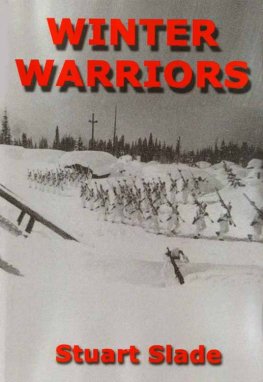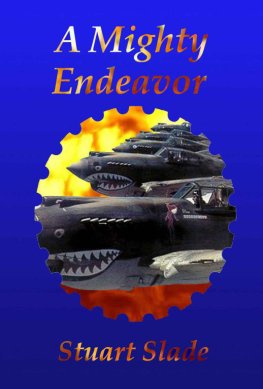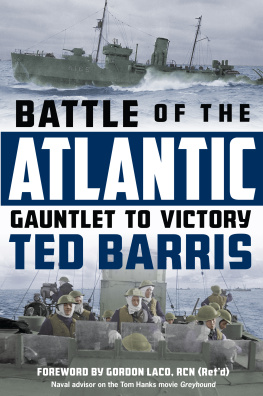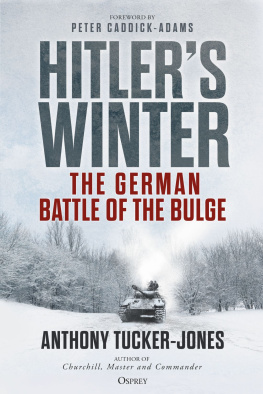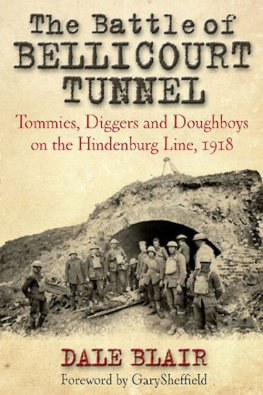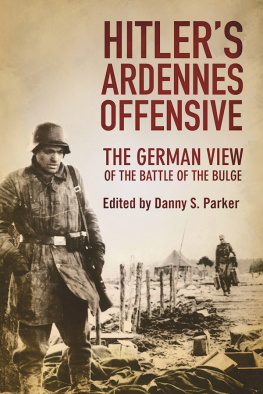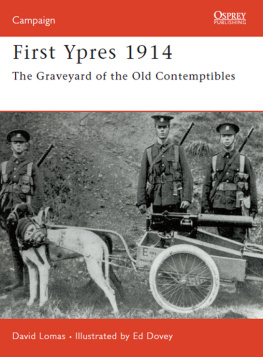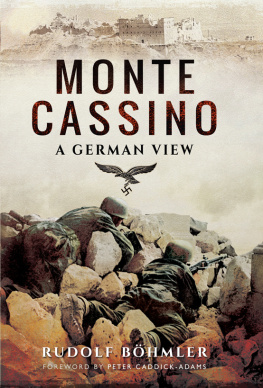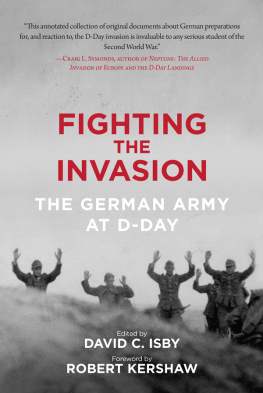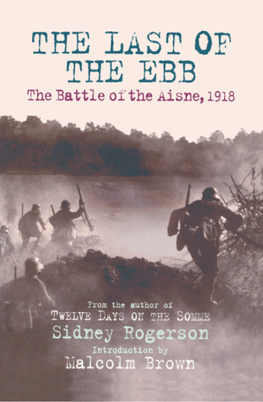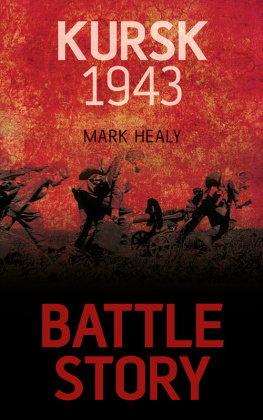Stuart Slade
WINTER WARRIORS
This book is respectfully dedicated to the memory of Marshal of the Soviet Union Georgy Konstantinovich Zhukov
Winter Warriors could not have been written without the very generous help of a large number of people who contributed their time, input and efforts into confirming the technical details of the story. Some of these generous souls I know personally and we discussed the conduct and probable results of the actions described in this novel in depth. Others I know only via the Internet as the collective membership of the History, Politics and Current Affairs Forum yet their communal wisdom and vast store of knowledge, freely contributed, has been truly irreplaceable.
I must also express a particular debt of gratitude to my wife Josefa for without her kind forbearance, patient support and unstintingly generous assistance, this novel would have remained nothing more than a vague idea floating in the back of my mind.
Winter Warriors is a work of fiction, set in an alternate universe. All the characters appearing in this book are fictional and any resemblance to any person, living or dead is purely coincidental.
Although some names of historical characters appear, they do not necessarily represent the same people we know in our reality.
Copyright 2010 Stuart Slade. ISBN 978-0-557-62072-2
CHAPTER ONE: RED SKY IN THE MORNING
It is time to kill some fascists, bratishka. Lieutenant Stanislav Knyaginichev let the bolt of his SKS rifle slam forward, chambering a round, ready to fire.
It is always a good day to kill fascists, Tovarish Lieutenant. This day is yet young. Sergeant Pietr Ivanovitch Batov spoke with grim satisfaction. As he did so, he looked on his young Lieutenant with care that was almost fatherly. Knyaz, as the men in the unit called him was a good officer. In fact, he had the makings of an excellent commander; assuming he survived. He started his career as one of Mekhliss zampolits, the political officers, so many of whom had done so much to harm the Russian Army in 1941. Knyaz had not been one of those. Instead, he had been a good zampolit, using his powers to aid rather than hinder. As 1941 had ground on in days of fire and death, he had become loved by his men as much as he had been respected by his officers. When, in November 1942, Stalin had died and unitary command was restored, he had been one of the zampolits selected to be trained as a real officer. Six months later, he had been assigned to the 78th and there he had lead his men well.
Then, he had gone down with pneumonia. His men mourned him for they knew that pneumonia meant death. This time, it did not; fate had once again saved Knyaz. Hed been taken back to the hospital the Americans had set up at Murmansk and given some of the new wonder drug they had there. Pensin, or something like that, Batov didnt know the name, but it had saved their Lieutenant. Now, once again, he commanded the Ski Group formed from the 78th.
This year, winter had come down early and very hard upon the Kola Peninsula. It froze the ground, covered it with thick snow and turned everything to ice. Already, the front line that had marked the furthest extent of the German advance was immobilized. The units that held it had gone into winter quarters. Cantonments provided some semblance of warmth and protection from the bitter cold and howling winds. The spaces between the camps were patrolled by ski troops. On the German side, they were Gebirgsjaegers, specialized divisions of mountain troops. They were specially equipped and trained to fight in the snows. Like all specialist troops they were very hard to replace. That made bleeding them worthwhile.
The Russians did things differently. Every one of their units had been expected to form its own ski patrols. That was no problem for the 78th Siberian Infantry Division. Siberians had been born on skis. To them, the cold of the Kola Peninsula was a mild thing compared with the frozen tundra of their home. Once the whole division had been Siberians. In 1941, they had been brought from the east and thrown against the Germans standing at Tula, on the very doorstep of Moscow. They had hurled the Germans back and hounded them through the blinding snowstorms, sparing none. That had been four years ago; few men from those days survived. Enough did to provide a cadre for the unit and to give the recruits a sense of being in an elite unit.
Knyaz checked the positions; the ambush was set. The snowmobiles that had brought them were parked several kilometers back. They had been tucked away where they were unlikely to be seen. Even if they were, their position was deceptive. It looked as if they were laagered just on the Russian side of the lines, not as if their ski troops had penetrated into German-held territory. Maskirovka, Knyaz thought, maskirovka, always maskirovka. Mislead, deceive, conceal. Never do the obvious, never do the simple. Always mislead and deceive. The Germans didnt practice that art with the same grim determination as the Russians and now they were going to pay the price. The Germans were very good but they got into bad habits. Like using the same patrol routes too often.
You ready, drug? Knyaz spoke to the youngest of his new recruits. Kabanov was a true Siberian but one who had only joined the unit a week before. Hed never seen combat so he was still a lowly drag, a friend, but not one raised to the comradely fellowship of the brats. He would be, soon, if he survived. The boy nodded, pretending to concentrate on his SKS but wouldnt speak because his mouth was dry with fear. No shame in that, but the boy wouldnt understand, not yet.
Theyre coming! The growl of engines could be heard. It was amazing how far it carried over the frozen snow. The Germans didnt use snowmobiles for their ski troops. Instead, they had a strange vehicle called the kettenkrad, a motorcycle with a sidecar but tracks instead of wheels at the rear. The patrol approaching had six of them, in two columns of three. Each pulled four ski-jaegers. Tough troops, Knyaz thought, well trained, well-acclimatized to this frozen wasteland. The ski-jaegers didnt blunder around in the cold the way the German infantry did. A pity only a half-platoon was approaching. Hed wanted to bag a whole platoon. Still, a half platoon, two squads, a prize worth taking.
His two DP-28 machine guns would open the game. The two crews were already be tracking their targets. Two Kettenkrads were out in front, forming the point element of the patrol. The machine gunners would let those pass, if they could, and catch the following four in the L-shaped killing ground. He carefully swept his eyes around again; not a sign of his men waiting motionless in the snow. Their rippled white and light gray camouflage suits blended perfectly with the snow that hid them.
The point element of the patrol swept past. The four vehicles of the main body followed them right into the killing ground. Their engines sounded small and weak against the immensity of the snow; yet the sound carried so well that Knyaz believed he could hear each individual pop of the engines. The engine sounds were drowned out by the snarl of the DP-28s. The fire walked across the snow, tearing into the kettenkrads at the front of each column. The nearest driver was hurled from his seat. His blood sprayed dark and agreeably red against the whiteness all around. His kettenkrad tumbled as it lost its driver, dragging the four ski-jaegers behind it into a chaotic, confused heap.
Knyaz sighted and fired his SKS, squeezing the trigger of the semi-automatic rifle again and again. Gone were the old days of fumbling with the bolt of the Moisin-Nagant, fighting the stickiness caused by lacquer from cartridges building up in the chamber. His rifle cracked again and again, ten rounds rapid fire. One of the fascists in the chaos below tried to move to get under cover but his body jerked and stopped.

